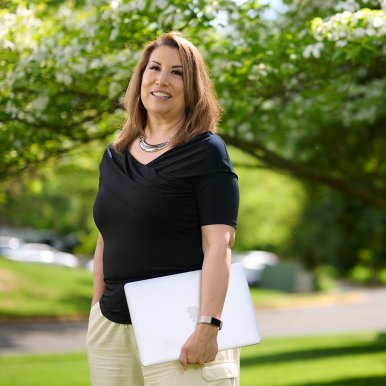A smaller slice of the pie
Female and minority founders lag in accessing capital
Rich Griset //May 31, 2024//


A smaller slice of the pie
Female and minority founders lag in accessing capital
Rich Griset //May 31, 2024//
In health care, there’s a moment when mistakes are more likely to occur: shift changes.
As rigorously as medical staff may document patient histories, these “handoffs” can present a weak link in care. According to The Joint Commission, a health care quality assessment organization, miscommunication contributes to two-thirds of serious adverse events in hospitals.
“Handoffs across shifts tend to be where the ball is dropped. The loss is costly for agencies and especially for relationships and quality of care for patients,” says LaToria Pierce, founder of Team Handoff, a Fairfax-based startup that offers a software solution to this problem for group and residential care.
Founded in 2021, Team Handoff was originally created as a job-sharing platform allowing two or more people to coordinate sharing the responsibilities and pay of a single full-time position. When Pierce tried to secure private funding for that vision in her first couple years of pitching, she ran into trouble. Part of the problem, she says, was that the concept seemed too advanced for funders, some of whom told her she’d “reached into the future and brought this method back.” There were also questions in pitch meetings that focused on her background instead of her company — conversations that Pierce, who is Black, says her non-Black founder friends didn’t encounter when they pitched.
Pierce’s experience mirrors a major issue for female and minority entrepreneurs, who can find it especially difficult to secure venture capital and angel funding.
According to data from Crunchbase, Black entrepreneurs typically receive less than 2% of all venture capital dollars, and companies led by Black women receive less than 1%. Companies founded solely by women received just 2% of total capital invested in venture-backed startups in the U.S. in 2023, according to PitchBook.
“Traditional venture capital … [is] a pretty small, closed system,” says Hampton-based Himalaya Rao, managing director and general partner of The BFM Fund, a seed-stage fund that primarily invests in Black-led ventures. “It’s really difficult for different types of founders to be able to access capital when there’s not a broader understanding of different lived experiences that then shape how different people articulate problems, think about solutions, all of that.”
While the problem is a longstanding one, experts and entrepreneurs say there are ways to help address it.

‘A long way to go’
Following the 2020 Black Lives Matter protests, corporations and investors opened up their wallets, giving more funds to Black- and minority-owned businesses than ever. After George Floyd’s murder by police in Minneapolis, America’s 50 largest public companies collectively pledged $49.5 billion to address racial inequality. Roughly 90% of those commitments were loans and investments from which those corporations could profit.
But when market forces led to a reduction in venture dollars in 2022, Black-owned startups were hit especially hard, with venture investment falling more than 50%, according to Crunchbase. As Paul Judge, managing partner and co-founder of Atlanta-based Panoramic Ventures, puts it, “when the U.S. economy has a cold, the Black community has pneumonia.”
Conditions aren’t much better for female-led startups. Last year, according to a report from PitchBook and Deloitte, female-owned startups raised $34.4 billion in startup funds, down from $61.5 billion in 2021. But, in a rare bright spot, the percentage of overall venture dollars that went to female-owned startups rose to 22.8%, up from 18.7% the previous year.
“Venture capital is a man’s game,” reads a 2023 report from Harvard Business Review. “Women are massively underrepresented among both venture-backed entrepreneurs and VC investors, with companies founded solely by women receiving less than 3% of all venture capital investments and women accounting for less than 15% of check-writers.”
Nearly 90% of venture capital-backed startups are run by men, and roughly 72% are run by white people, according to a report by Diversity VC, a global nonprofit promoting diversity in the VC ecosystem.
“You’re more likely to invest in someone who looks like you, who is in your community,” explains Sarah Chen-Spellings, Fairfax-based co-founder of Beyond the Billion, a consortium of venture funds that have pledged to invest more than $1 billion in female-founded companies. Of their first $1 billion, $638 million has been deployed into 795 companies globally, including
11 unicorns.
“That is not to say that it is the responsibility of women and people of color alone [to invest in female- and minority-owned startups],” Chen-Spellings adds.
Rao, co-founder of The BFM Fund, says it isn’t just diversity in racial, gender and sexual orientation that is lacking representation in the venture capital sphere, but also socioeconomic, educational and operational diversity.
“When [diverse startup founders] go to funders, they’re being met with people that don’t necessarily understand their background,” Rao says. “If they’re articulating a solution in a certain way, it’s not being well received, because there’s a lot of pattern-matching that happens in venture capital.”
That’s something that Kristin Richardson, founder of Richmond-based startup Sherah, is familiar with firsthand. Founded in 2022, her bootstrapped business provides assistants to mothers who wish to stay in the workforce.

“Male investors are less likely to understand the magnitude of the problem we’re solving or the unique nature of how we’re solving it — even when they’re dads,” says Richardson. “I hear quite frequently, ‘Is that really a problem?’ from potential male investors. Whereas, I hear from female investors things like, ‘Wow, this is amazing! Where was this when my kids were little?’”
Stephanie Campbell, general partner of The Artemis Fund, a Houston-based venture capital fund founded in 2019, says raising capital is a struggle regardless of background. She recalls conducting more than 1,000 Zoom calls for Artemis’ first two funding rounds, in which she raised $19 million and $36 million respectively. Still, she says, biases in venture capital investing hurt everyone.
“Venture capitalists that are not investing in diverse perspectives are leaving money on the table. There’s plenty of data that diverse perspectives make better teams, they outperform [less diverse ones],” says Campbell, whose fund invests in underrepresented founders nationally, including Goodfynd and Naborforce in Virginia. “You miss competitors. You miss opportunities when you don’t have all the information and diverse perspectives.”
And the problem isn’t unique to the high-risk, high-reward world of venture capital.
“The whole finance ecosystem is not very diverse,” says Aurelia Flores, co-founder of Citrine Angels, an angel investing group for women, and investment director of the Virginia Innovation Partnership Corp.’s Virginia Venture Partners investment fund. “Ironically, the venture ecosystem is more diverse than the rest of the finance ecosystem. We still have a long way to go.”
‘Systemic solutions’

As big a problem as this lack of equity for women and minority founders represents, there are ways to lessen its impact.
Chen-Spellings says solutions should start at the limited partner level.
“Make diversity a condition of your capital,” says Chen-Spellings, who also hosts the business podcast “Billion Dollar Moves.” “Broaden your assessment criteria to enable others to get into the system and remember that nine out of 10 startups fail. Just because there’s one failure in this [demographic] group doesn’t mean that you shouldn’t invest again.”
Another way is to add diverse perspectives to private equity leadership. Historically, white men have dominated these positions; a 2023 McKinsey & Co. report states that women make up just 33% of entry-level investing roles and only 15% of managing director-level investing roles.
“Systemic problems require systemic solutions,” Rao says. “Representation is step one, but then we also need to be intentional in how we change fundamental models so that we support the pain points and the starting points of many more different types of founders.”
But the Harvard Business Review report states that getting more women involved in venture financing might “be a mixed blessing, because it may actually make it harder for female founders to raise additional rounds of financing.” After analyzing more than 2,000 venture-backed firms, the report concluded that female founders were consistently less likely to close a second round of investing if their first round was female-funded only. This finding held true regardless of the industry, size of the initial funding round, prestige of the investor or geographic location.
Jen Linton, founder and CEO of Glen Allen-based insurance technology company Fenris Digital, says it has been rare during her career to pitch for venture capital groups that had women or minority decision makers in the room. She advocates for angel investment groups that focus on female- and minority-
owned companies.
“There’s a lot of wonderful angel groups,” says Linton, who founded Fenris in 2016. “Virginia has many. If women could become investors in the angel sphere and direct some of their financial portfolio into this class of risk, that actually does a lot to improve the outcomes.”
In addition to shifts in how venture capital operates, incubators, accelerators and funds can also be part of the solution.
Debbie Irwin, managing director of Richmond-based startup accelerator Lighthouse Labs, says accelerators need to make sure that they’re going after diverse startups. Beyond refining business startups, she says, an accelerator needs to help develop founders in case their initial concepts don’t work out.
“We’ve trained that founder on the mindset and skill set needed to make that second or third or fourth [attempt] successful,” Irwin says. “We’re creating the kind of founders that VCs like to see.”
Irwin says that accelerators also need to prioritize companies with underrepresented founders and be mindful of the wording of application questions so they don’t deter potential applicants.
Then there are governmental efforts, like the U.S. Department of Treasury’s State Small Business Credit Initiative (SSBCI), which provides funding to small businesses through equity and venture capital programs. Treasury has put specific metrics on each state based on demographics of how much of those funds must be allocated to female- and minority-owned businesses; Virginia’s goal is 33%.
VIPC, a nonprofit corporation established by the Virginia General Assembly to accelerate early-stage technology companies, will allocate more than $175 million in funding to support small businesses and the funds that invest in them through Virginia Venture Partners (VVP), its venture capital arm.
The Artemis Fund has applied to VIPC to be a fund manager of SSBCI funds in Virginia through VIPC’s fund of funds program. “This program that Treasury has is absolutely going to spur innovation,” says Campbell with Artemis. “Not only will we deploy the money that Virginia invested, [but] we’ll also bring our co-investors to
the table.”
Blair Durham, co-founder and president of Black Brand, a Black chamber of commerce for Hampton Roads, says groups like hers can help fill in knowledge gaps about funding and resources, and help female and minority founders with networking and accessing funds.
“We host demo days where our program participants are interfacing with up to 30 bankers from five to seven institutions, everything from credit unions to community development, financial institutions, which have an onus to serve underserved populations, as well as traditional banks,” says Durham.
While LaToria Pierce has yet to secure private equity or angel funding for Team Handoff, she did receive a $20,000 grant from Norfolk-based startup accelerator 757 Accelerate last July. She advocates that funders broaden their perspective to consider more diverse founders and says female and minority founders should be extra-prepared to pitch their businesses and raise capital.
“When you’re an underrepresented founder,” she says, “you have to come into this industry knowing that you’ll have a few extra steps to climb.”

















